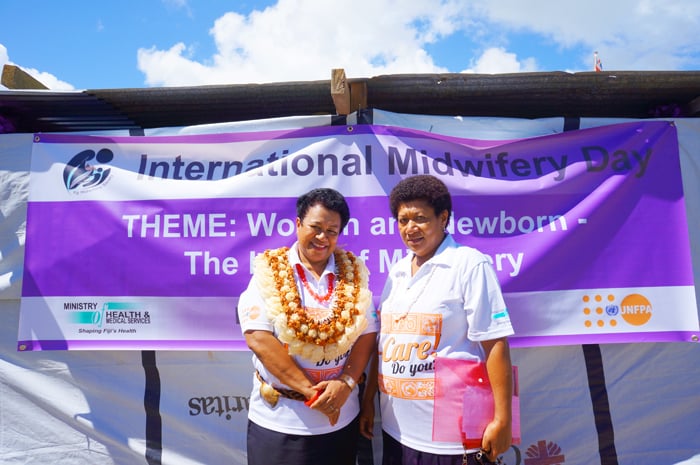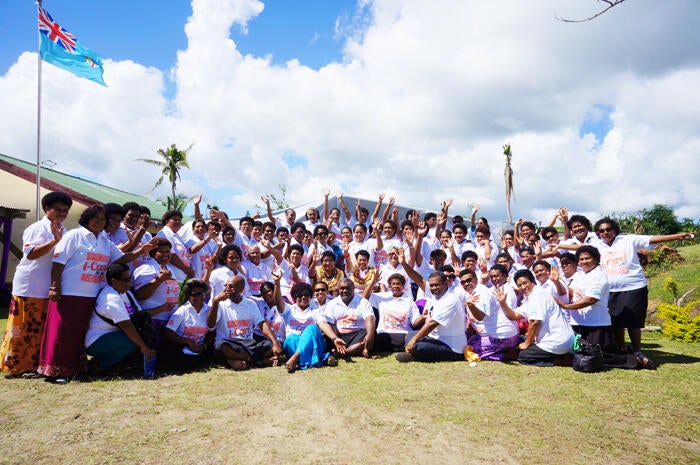In 2013, just three years ago, the majority of an estimated 289,000 women and about three million newborn babies died globally from preventable complications and illnesses. They could have been saved with proper antenatal, delivery and post-natal care - services provided by trained midwives.
The world has seen a steady decline in maternal and newborn deaths since 1990. Well-trained midwives could help avert roughly two-thirds of all maternal and newborn deaths, according to the 2014 State of World Midwifery report (the second report after the first published in 2011).
Investment in midwives represent a potential 16-fold return; midwives can provide 87 per cent of the needed essential care for women and newborns if educated and regulated to international standards.
Of the 73 of the 75 low and middle-income countries that were focus of the studies, the report states that only four have a midwifery workforce that is able to meet the universal need for the 46 essential interventions for sexual, reproductive, maternal and newborn health.
While the 73 countries accounted for 92 per cent of the global maternal and newborn deaths and stillbirths, they only had 42 per cent of the world's medical, midwifery and nursing personnel.
Fiji is one of the Pacific island countries that is working towards meeting desired standards set by the World Health Organization (WHO), Fiji Director Nursing Services Silina Waqa said on International Day of the Midwife (May 5).
WHO advocates for "skilled care at every birth" by accredited health professional, such a midwife, doctor or nurse, who has been trained to manage uncomplicated pregnancies, deliveries and the immediate post-natal period: skilled birth attendants are also able to identify complications and obtain timely emergency assistance.
Supporting nurses who wish to go into the midwifery field would not only make a difference at a very personal level for couples and families, with safe live births but the improvement in maternal health and neo-natal services will also weave a successful story for our island communities in relation to the Sustainable Development Goals (SDGs).
While maternal mortality has been halved in the last 25 years, some 300,000 women still die during pregnancy and childbirth, and almost 3 million babies do not survive their first four weeks of life.
Maternal mortality is the number of women who die from pregnancy-related causes (while pregnant or within 42 hours of pregnancy termination) per 100,000 live births.
The World Bank estimates (2015) Fiji's maternal mortality ratio at 30, Solomon Islands 114, Papua New Guinea 215, Tonga 124, Federated States of Micronesia 100 and Vanuatu 78; this compares to Australia 6, New Zealand 11, Finland 3 and France 8.
"So if we want to follow WHO standard, based on our population, we need to have roughly over 3500 midwives in-country so Fiji's service could achieve the ratio of between three to four per 1000 people," Ms Waqa said.
"We are working towards that. We are thankful to our partners, UNFPA in terms of midwifery development. DFAT has indicated that it could sponsor another 10 for midwifery studies - that's the top priority for nursing training in this country.
"We want to train more midwives, we want to build our midwifery numbers. The demand for midwifery services in accelerating year by year and we can only respond if we build our numbers well.
"Whilst working towards building midwives numbers in-country, we are seriously considering bringing in retired midwives and we have done that for the last three years - at retirement these women have experience, the know-how, clinical and leadership skills and their midwifery practice is top-notch."
Ms Waqa said as an incentive, retired midwives are offered contracts to return to maternity wards at the level they retired in. Returning to the ward Ms Waqa said would also allow mentorship of younger midwives and nurses.
Ms Waqa said while work towards an increased number and academically-strengthened pool of midwives was yet to bear fruits, retired midwives were doing excellent work in providing the much-needed number of hands to ensure a good, healthy beginning for Fijians.
Midwives have also been critical to the health response, particularly the sexual and reproductive health and rights-related response supported by the United Nations Population Fund (UNFPA) Sub-Regional Office and its partners.
"Fiji midwives have been central to our work in the Pacific, including those who have retired from formal services but who responded positively to our call for midwives to support UNFPA's humanitarian efforts, both in Fiji and Vanuatu," Dr Laurent Zessler, UNFPA Pacific Sub-Regional Office Director and Representative said.
"The UNFPA salutes Pacific midwives generally who have had to work in challenging circumstances, geographical or otherwise, sacrificing time with their own children to ensure a good beginning for newborns and their parents."
Well-trained and supported midwives working in communities are uniquely positioned to provide the compassionate, respectful and culturally sensitive care a woman needs during pregnancy and childbirth. Midwifery is equally important for newborns during the critical first month of life, and is a significant contribution to sexual and reproductive health in general.
If deployed in larger numbers, trained midwives could avert approximately two thirds of these deaths. Significant investments in midwifery are essential if the world is to achieve its ambitious goals of reducing maternal and newborn deaths. Midwives are, therefore, essential to achieving the SDGs.
UNFPA is helping train and support thousands of midwives in more than 100 countries. A recent survey estimated that in 57 of these countries, UNFPA has trained 66,000 midwives over the past seven years. These critical health-care providers can help more than 11 million women to give birth safely each year, but much more needs to be done.
On this International Day of the Midwife, we at UNFPA renew our commitment to working with global partners and countries to strengthen midwifery skills and capacities.



